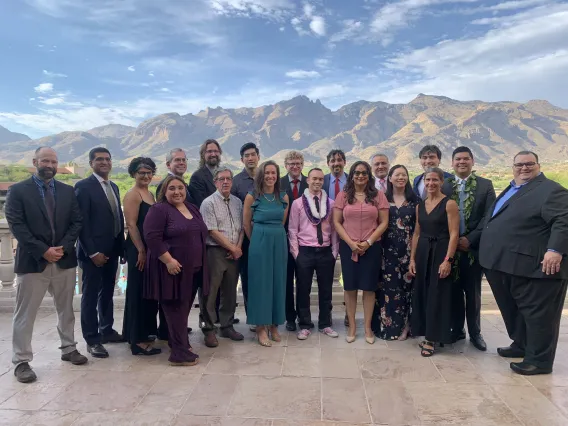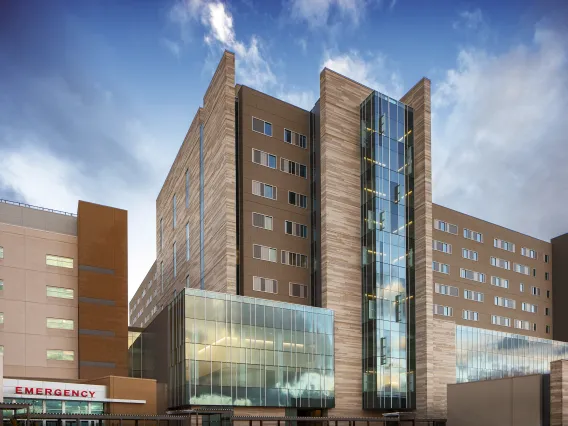General Surgery Residency Program
Broad clinical experience, comprehensive education and excellent opportunities for achieving competence in basic and clinical investigation.
Our program gives surgical residents broad clinical experience, comprehensive education in surgical sciences and excellent opportunities for achieving competence in basic and clinical investigation in an equitable and inclusive environment.
The Department of Surgery at The University of Arizona has received national and international recognition in a number of fields. We are now home to seven divisions, each of which include faculty members who are committed to mentoring trainees in clinical and research experiences:
- Abdominal Transplant
- Cardiothoracic Surgery (Including the Section of Thoracic Surgery)
- General Surgery (Including the Section of Minimally Invasive, Robotic and Bariatric Surgery)
- Pediatric Surgery
- Trauma, Surgical Critical Care, Burns, and Acute Care Surgery
- Surgical Oncology (Including the Section of Plastic and Reconstructive Surgery)
- Vascular and Endovascular Surgery (Including the Section of Podiatry)
Our program provides surgical residents with broad clinical experience, comprehensive education in surgical sciences, and excellent opportunities for achieving competence in basic and clinical investigation.
Three Tucson hospitals make up the foundation of the program: Banner — University Medicine (BUMC), the Southern Arizona Veteran's Affairs Health Care System (SAVAHCS) and Tucson Medical Center (TMC). In addition, the residency program uses other community facilities to further extend the surgical experience. Consequently, the patient base of the training program far exceeds that available to many programs in the United States. We believe that only with a broad scope of clinical programs and a variety of tertiary services can the resident receive a comprehensive education in modern surgery.
The degree of clinical responsibility and of technical operative experience increases progressively with each year of training so that the residents mature not only in technical skills, but also in clinical judgment and interpersonal skills. At the same time, we believe that each resident must view his or her postgraduate education as the beginning of a lifelong inquiry into the application of scientific knowledge to the treatment of surgical disease.
General Surgery Residency Program Goals
Train clinically competent, conscientious and empathetic general surgeons through a program of graded responsibility for pre- and postoperative patient care and operative management.
Encourage habits of self-education that will persist throughout the resident’s surgical career by emphasizing participation in a variety of educational processes, including attending conferences and scientific meetings, studying surgical literature and engaging in discussions with teachers and peers.
Promote an interest in and foster the ability to pursue research, including developing the ability to analyze and evaluate scientific publications and to participate in basic and/or clinical research.
Residents in our General Surgery Program receive a blend of training at academic and community medical centers, including:
- Banner – University Medical Center Tucson, the only ACS-certified Level I Trauma Center in Tucson
- Southern Arizona Veteran’s Affairs Health Care System (SAVAHCS)
- Tucson Medical Center (TMC)
- Tuba City Regional Medical Center, which serves 35,000 Hopi, Navajo and Paiute tribal members
- Flagstaff Medical Center, a state-of-the art healthcare Level I Trauma Center
These locations offer a much broader and inclusive patient base than most programs in the United States. This broad scope of clinical programs gives residents a comprehensive education in modern surgery.
In our program, a resident’s clinical responsibility and surgical experience increase each year, so one matures not only in technical skills, but also in clinical judgment and interpersonal skills.
A postgraduate education is just the beginning of a lifelong inquiry into applying scientific knowledge to treating surgical disease. Our alumni compete for the most highly regarded fellowships or practice independently across the United States and internationally.
Residency Training
The University of Arizona - Tucson General Surgery Residency Program provides five years of training in general surgery. Residents are selected through the National Resident Matching Program (NRMP) for categorical and preliminary positions. The program does not have a pyramidal system. Residents are encouraged to participate in research projects and, during elective periods, may work in the laboratories of surgical or other faculty members.
Residents are not required to complete a research year, but we expect all residents to develop the ability to analyze and evaluate scientific publications and to participate in basic and/or clinical research according to their interests. We encourage extended research experience for those considering academic careers, and residents can request one or more years away from clinical training to pursue additional research, typically after their third year. All residents are encouraged to publish interesting case reports, retrospective reviews, or the results of clinical investigations.
Faculty members from other University of Arizona residency programs, including Urology, Orthopedic Surgery, and Emergency Medicine, also participate in the various surgical teams. In-house call is typically every third to fourth night and in many specialty services (and during the fourth and fifth years) the resident may take call from home.
Here’s what residents can expect during our five-year residency training program.
First Year
We assign first-year residents to general surgery rotations at Banner – University Medical Center Tucson, Tucson Medical Center and the Veterans Administration Medical Center for about six months. The rest of the year is devoted to month-long rotations in vascular surgery, anesthesiology, trauma surgery and pediatric surgery.
Second Year
In the second year of training, residents are exposed to additional surgical specialty experience, including cardiothoracic surgery. The year rounds out with more general surgery experience, the basics of trauma management and rotations in rural Arizona, the critical care unit and the endoscopy unit.
Third Year
The third year is spent in general surgery rotations at all three training hospitals and in an external rotation in Flagstaff, AZ. On each general surgery service, residents work directly under the supervision of the chief resident, and they assume greater responsibility in managing patients and help educate junior housestaff and medical students.
Fourth Year
In the fourth year, in addition to continuing training in general surgery, residents train in several specialized areas of surgery, including transplantation, trauma surgery and thoracic surgery. They also have an outside rotation in Flagstaff.
Fifth Year
During the final year of training, the chief resident leads general surgery services at Banner – University Medical Center Tucson, Tucson Medical Center and the Veterans Administration Medical Center. Chief residents are responsible for managing their clinical service, supervising and teaching intermediate and junior residents and overseeing the education of third- and fourth-year medical students. By the end of the fifth year, residents typically have performed 1,000 or more procedures.
Resident Education
Our residents have access to unique education opportunities that hone their technical skills and advance their competency to achieve the highest outcomes possible — in the program and in the field.
Each Wednesday begins with a Quality Improvement & Safety Conference (M&M), followed by a Grand Rounds presentation. Residents then have up to two hours of dedicated didactic conference following the SCORE curriculum provided by the American College of Surgeons.
Journal Club is held six times a year at different locations in Tucson. The chief residents select landmark articles for presentation, reviewing any recent groundbreaking or practice-changing papers or research. Junior and senior residents are assigned articles for leading the discussion. Junior residents read and critique the article and present it to the group. Senior residents assist the junior residents and serve as backup presenters.
As a part of continuing quality improvement on technical skills, there is a monthly Cadaver Lab consisting of two-hour sessions where residents perform specific procedures.
Fundamentals of Laparoscopic Surgery (FLS) establishes a standard set of didactic information and manual skills that guides surgical residents in performing basic laparoscopic surgery. By mastering the curriculum and skills, surgical residents and surgeons can initiate and carry out laparoscopy more effectively, with greater skill and lower complication rates.
Fundamentals of Endoscopic Surgery (FES) establishes a standard set of didactic information and manual skills designed to teach and evaluate the fundamental knowledge, clinical judgement and technical skills required to perform basic endoscopic surgery. The Arizona Stimulation Technology and Education Center (ASTEC) provides collaborative learning opportunities in a high-tech, realistically simulated environment. All PGY 1 residents in general surgery are included in the ASTEC training program.

General Surgery Residency Leadership
Contact our team for any questions about the general surgery residency rotation. We’re here to help residents get the most from their education.

Clinical Sites
Our teaching locations include Banner – University Medical Center Tucson, our primary teaching hospital; Tucson Medical Center, a community-based hospital; Southern Arizona Veterans Affairs Hospital; and other community sites.
How to Apply
Learn more about what you need to do to meet the application requirements for our general surgery residency program.

